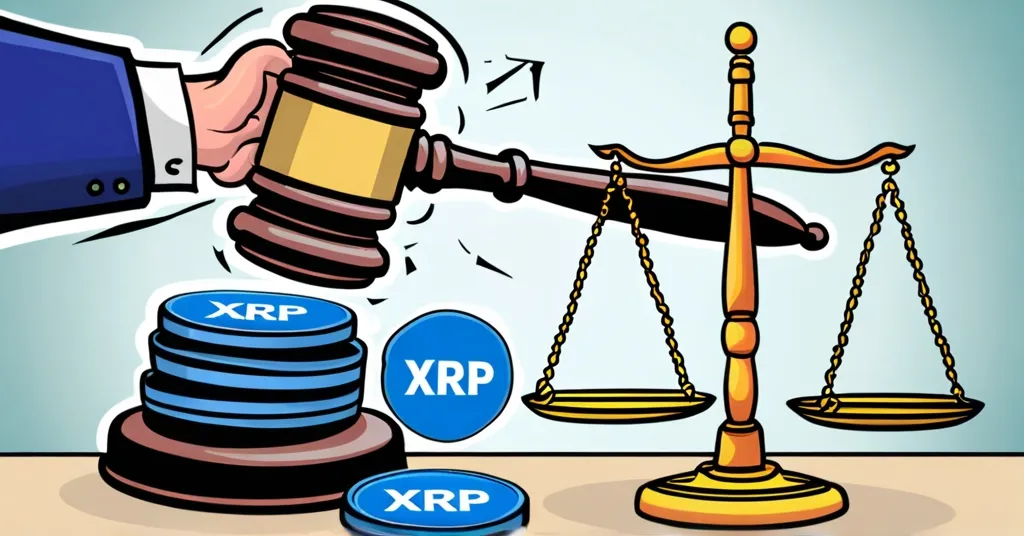Ripple’s CLO Urges SEC to Focus on Securities: Impact on XRP and Crypto Regulation

Ripple’s Legal Chief Urges SEC to Stick to Securities: What It Means for XRP and Crypto Regulation
Stuart Alderoty, Ripple’s Chief Legal Officer, has publicly called on the Securities and Exchange Commission (SEC) to adopt a more legally sound approach to cryptocurrency regulation. His remarks underscore a pivotal moment as the crypto industry anticipates regulatory shifts under the incoming Trump administration and the nomination of Paul Atkins as the new SEC chair.
- Ripple’s CLO calls for SEC to focus on securities transactions
- Digital tokens not inherently securities but can be involved in security transactions
- SEC’s notion of tokens “evolving” criticized as baseless
- Optimism for resolution of SEC vs. Ripple lawsuit in 2024
Alderoty emphasizes that the SEC’s jurisdiction should be strictly limited to securities transactions. In his view, a digital token itself, such as XRP, Ripple’s cryptocurrency, is not a security. However, it may be part of a security transaction. To illustrate this point, Alderoty uses an analogy: “Selling a gold bar with a contractual right, title, or interest in my gold mine? Likely a security transaction,” he explains. “Selling that same gold bar without post-sale rights or obligations? Just an asset sale—the SEC can’t police it.” This distinction is vital as it challenges the SEC’s broad interpretations of what constitutes a security in the crypto space.
Furthermore, Alderoty criticizes the SEC’s concept of tokens “evolving” from securities to non-securities. He dismisses this idea as a “made-up fallacy with no legal basis,” arguing that such a notion lacks legal grounding and should be abandoned by the SEC.
The ongoing SEC vs. Ripple lawsuit, initiated in late 2020, is expected to reach a potential resolution in 2024. The incoming Trump administration, known for its pro-crypto stance, along with the nomination of Paul Atkins as SEC chair, adds a layer of optimism for Ripple. Atkins, a former SEC commissioner and co-founder of the Token Alliance, could steer the SEC towards a more favorable regulatory environment for cryptocurrencies like XRP.
The Second Circuit Court’s review is another critical factor that could impact the classification of XRP as a security. A ruling that aligns with Judge Torres’ earlier decision, which clarified that XRP is not inherently a security, could set a precedent for how other digital tokens are regulated.
Analysts are closely monitoring these developments, predicting a potential major price surge for XRP if the SEC shifts its enforcement approach or drops its appeal. The market’s anticipation of a more crypto-friendly regulatory environment has already started to influence investor sentiment, with increased investments in XRP and other cryptocurrencies.
The broader regulatory landscape remains uncertain, with the SEC under Gary Gensler actively pursuing enforcement actions against the crypto industry. However, the transition to Atkins could signal a shift in approach, although the extent of this change remains to be seen. The outcome of the SEC vs. Ripple lawsuit could not only impact Ripple and XRP but also set a precedent for the entire cryptocurrency industry, potentially encouraging further innovation and investment in blockchain technologies.
Industry experts like Paul Grewal, Chief Legal Officer of Coinbase, have expressed support for Atkins’ nomination, hoping for a more balanced regulation in the U.S. securities markets. However, concerns from figures like Congressman Brad Sherman highlight the ongoing debate over the appropriate level of regulation in the crypto space.
As we navigate these regulatory waters, it’s clear that Ripple’s fight with the SEC is more than just a legal battle; it’s a fight for the future of cryptocurrency regulation in the United States. With potential shifts in leadership and policy, the crypto industry watches with bated breath, hopeful for a more favorable and clear regulatory path forward.
While the optimism is palpable, it’s important to acknowledge the challenges ahead. The SEC’s aggressive stance under Gensler, the potential for prolonged legal battles, and the complex nature of cryptocurrency regulation could all pose hurdles. Nevertheless, the crypto community remains hopeful that a more balanced and legally sound approach to regulation will prevail, fostering growth and innovation in this dynamic sector.
Key Questions and Takeaways
- What is the current stance of Ripple’s Chief Legal Officer on SEC regulation?
Ripple’s CLO, Stuart Alderoty, believes the SEC should limit its jurisdiction to securities transactions and avoid overreaching its authority.
- Is a digital token itself considered a security according to Ripple’s CLO?
According to Alderoty, a digital token is not inherently a security, but it can be part of a security transaction.
- What is the expected impact of the Trump administration and Paul Atkins’ nomination on the SEC vs. Ripple lawsuit?
The Trump administration and Paul Atkins’ pro-crypto stance are expected to create a more favorable environment for Ripple, possibly leading to a quicker resolution of the lawsuit.
- What could happen to XRP’s price if the SEC changes its enforcement approach or drops the appeal?
Analysts predict that XRP could experience a significant price surge if the SEC shifts its enforcement approach or drops its appeal.
- What is the significance of the Second Circuit Court’s review in the SEC vs. Ripple case?
The Second Circuit Court’s review could affirm or expand upon previous rulings, potentially impacting the classification of XRP as a security.



